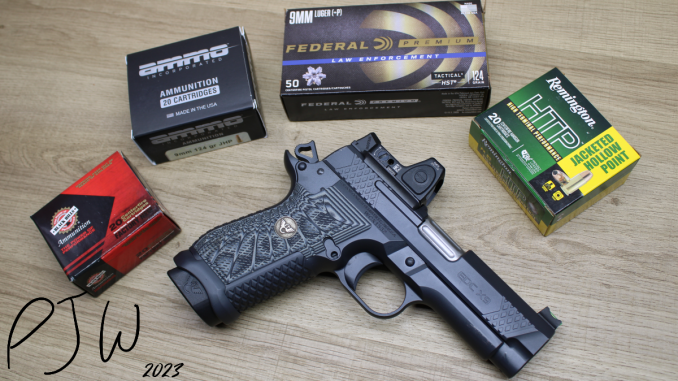
As part of my ongoing review process for the Wilson Combat EDC X9, I wanted to test out a variety of ammunition. I’ve fed the gun a steady diet of range ammo, and a small pile of Federal HST that I carry. Despite this I wanted to try more. I started accumulating a few different carry ammos, but then I received an email from Paul over at AmmoToGo.com. Paul reached out, and wanted to offer us some ammo, and I decided to take him up on this. Via AmmoToGo, I was able to pick up 10 additional types of 9mm self defense ammo to test in the EDC X9. What’s my testing protocol, and how did each ammo perform?
The EDC X9 Ammo Testing Protocol
I’m not a scientist, and I’m not playing one on TV. However, I wanted to do a series of tests with the carry ammo, that would show most of the elements of it. Here’s what I came up with:
- 5 rounds fired at 15 yards, slow fire, to test practical accuracy and recoil impulse.
- Perform a Vicker’s Test using the ammo.
- Fire 5 rounds from retention, to see if we can induce a malfunction with the ammo.
During the testing, I hope to test the following:
- Accuracy and consistency
- Reliability, both with two hands and a normal shooting position, and from retention
- Perceived and felt recoil, and muzzle blast
I fired 20 rounds of each variety of ammo, all on the same day. The same gun was used (duh), and was cleaned prior to shooting on the day. I was also warmed up prior to doing the testing, so that the results would be a little more consistent.
Here, I am not factoring terminal ballistics into the testing. I’ve let the folks that have done proper gel testing take care of that, as I do not have the capabilities to do so. I’m just looking at how the ammo actually shoots.
In mentioning it, I would like to say that AmmoToGo did not send me the tested ammos with any sort of expectation of a review of them, or their site. However, I will be talking about my experience with them later on in the article. So what ammos did we test?
The Ammo Spread
We tested 13 different ammos as part of this experiment. Three of them were procured out of my pocket, and the remaining 10 came from AmmoToGo. Here’s what we tested (organized by bullet weight):
- S&B 100gr XRG
- Barnes 115gr VOR-TX TAC-XP
- Hornady 115gr American Gunner JHP
- Black Hills 115gr Extra Power JHP
- Black Hills 115gr +P JHP
- Sierra Outdoor Master 124gr (procured by me)
- Federal HST 124gr (procured by me)
- Federal HST 124gr +P (procured by me)
- Ammo Inc. 124gr JHP
- Black Hills 124gr +P JHP
- Federal HST 147gr
- Remington 147gr HTP
- Underwood 147gr +P XTP
I chose the above ammos as most are ones I have seen in local stores, or seen recommended online. In the spirit of full disclosure, I normally carry Federal HST 124gr standard pressure in my EDC X9, and the +P variety in my compensated Glocks. I like that ammo, and like the terminal ballistics that they provide.
The conditions on the testing day were horrid. 30 degrees, windy, and sleeting rain were the conditions, but we pushed on. How did each ammo do, and did we run into any malfunctions?
S&B 100gr XRG Defense
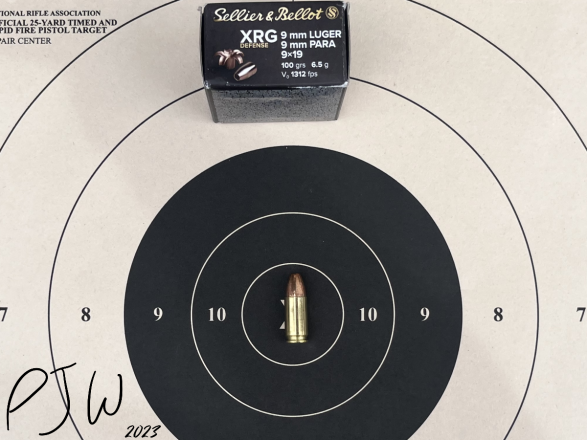
Sellier & Bellot is a Czech ammo maker, and I’m sure you’ve shot their ammo before. They are generally on the cheaper end for bulk 9mm, and a lot of the drills I shoot are shot with 115gr and 124gr S&B ball. The ammo tested here is their 100gr XRG, a totally copper, lead free bullet. Advertised muzzle velocity is 1312 FPS, without a testing gun being mentioned. I’m not a fan of lightweight 9mm for self defense ammo, as the weight tends to lead to worse terminal ballistics. With S&B also being known as a cheaper ammo company, I was unsure as to how the ammo would shoot.
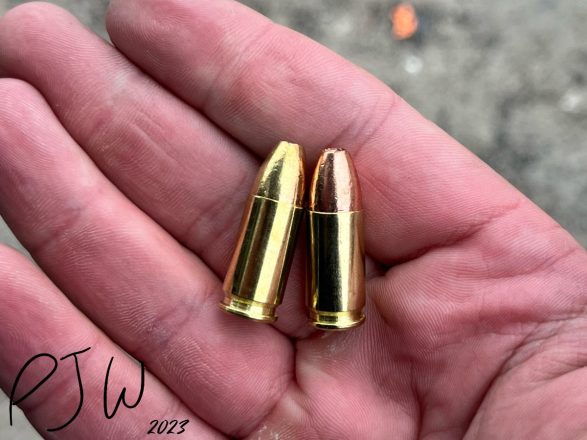
On initial look, the ammo is not super consistent. I had a cartridge that had a different finish on it, similar to that of the FMJ stuff, and that is honestly not surprising with S&B. I also found quite a few bullets with bent petals on the hollow point. How did the ammo shoot thought?
The ammo shot a little softer than standard range 115gr ball, but it wasn’t that much different. Practical accuracy felt fine, as the misses I had were certainly on me. Reliability out of the 20 rounds was also fine, to be expected.
Price online is about $.80 per round, which is on the average end of the spectrum. While the ammo worked and shot fine, it wasn’t anything special. This ammo shot a lot like range ammo, but not in an “outstanding” way.
Barnes 115gr VOR-TX TAC-XP
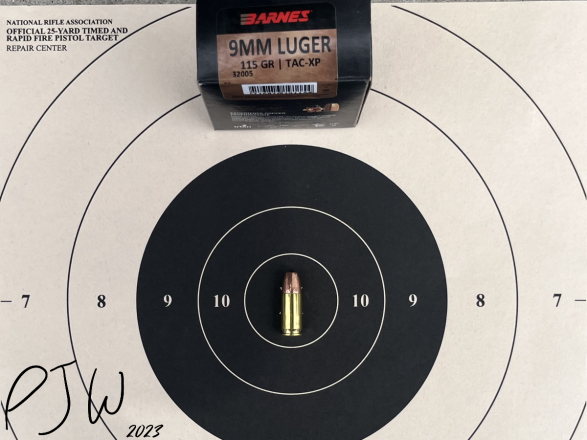
Living in Utah, I had to test out a Barnes load. Barnes is located in Central Utah, and makes a wide range of ammo. I’ve actually got a friend that works at Barnes, but that obviously did not impact the ammo testing. The load I tried in the EDC X9 is the VOR-TX TAC-XP 115gr. This load uses the Barnes XPB bullet, which is yet another fully copper, leadless projectile. Advertised muzzle velocity is 1125 FPS, without a testing gun being mentioned. I’ve generally found Barnes stuff to be pretty consistent, and I expected the same here.
The TAC-XP shot very well. It was soft shooting, but not sluggish. Accuracy felt above par, and even with me shooting poorly on this day, I felt good with the Barnes ammo. I did some of the best shooting of the day with this ammo. It was 100% reliable, and even smelled quite clean.
Price is about $1.10 per round, which puts this on the slightly pricier side. Overall, this ammo shot quite well.
Hornady 115gr American Gunner JHP
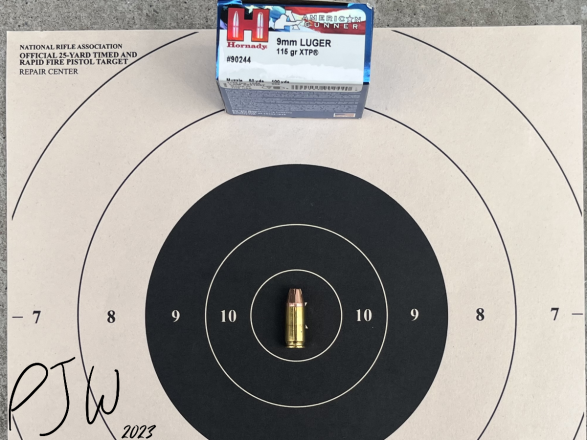
Hornady makes a pile of self defense 9mm, but I wanted to try out their American Gunner 115gr XTP. This load is a pretty common one, as I’ve seen it in small shops, and big box stores alike. Hornady generally makes fairly high quality ammo, so I wanted to test this one out. The XTP bullet is a fairly proven design, with a standard JHP style projectile. Advertised muzzle velocity is 1155 FPS, out of a 4″ barrel. How’d the ammo shoot?
Shooting characteristics were quite pleasant. The ammo felt slightly hotter than standard 9mm FMJ, with a little more slide velocity. The practical accuracy was quite good, and the reliability was excellent too. At about $.96 per round, this ammo is about average price for self defense loads. Would I carry this load? Probably not, but I’d be happy to shoot drills with it in the EDC X9.
Black Hills 115gr Extra Power JHP
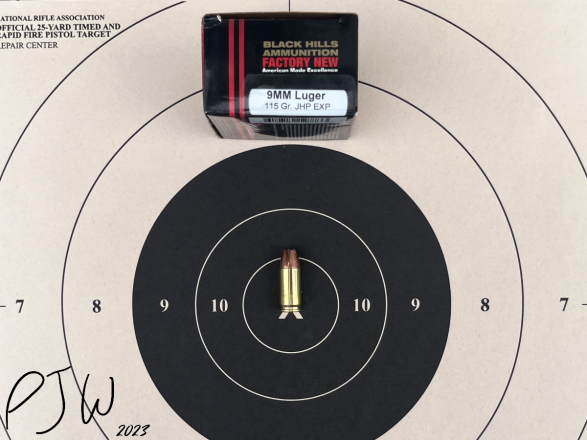
We have three Black Hills self defense loads, and spoiler alert, these were among the harshest of the loads I shot. The first load was the 115gr JHP EXP (Extra Power). This load uses Black Hills’ own JHP bullet, and has a fairly high muzzle velocity of 1200 FPS out of a 4.5″ barrel. That is pretty fast for a non-plus pressure round. Black Hills generally makes good, consistent ammo, so how did this one perform.
The EXP is quite stout, but was not too uncomfortable to shoot. This load was pretty consistent, and the accuracy felt quite solid. However, this load is considerably louder, and the felt recoil is considerably more than the prior loads. Reliability was 100% with the EXP. This feels like a “proper” self defense load, in that it is hot. The price per round is $.97, which puts it about average. This ammo wasn’t horrible to shoot, but the next one was.
Black Hills 115gr +P JHP
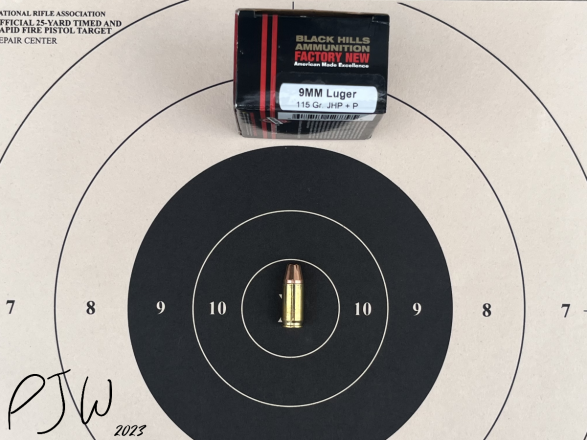
The Black Hills 115gr +P JHP is the same round as the previous load, but is plus pressure. With this change, the muzzle velocity is now 1250 FPS out of a 4.5″ barrel. While this might now seem like a big change, the shooting characteristics are much different.
After a few days of time to think on it, this was the harshest ammo I tested. The muzzle energy is more than the 124gr +P Black Hills load we’ll discuss below, and the blast and slide velocity certainly felt like it. This ammo was hot, had a bit of recoil, and was generally uncomfortable to shoot. We also had a malfunction while using this ammo, however, that malfunction was magazine related. One of the issues I ran into a few times was with new magazines. When the last round was getting ready to be chambered, the gun would lock open. However, it was not fully engaging the slide release, and a jostle or tap would send the slide home. This was deemed to be caused by a follower sitting higher with one round on it. This issue occurred a few times, but was not ammo caused.
At $1.00 per round, this is fairly average priced. However, I wouldn’t recommend this ammo in the EDC X9. This gun is just not comfortable, or easy to shoot with this load.
Sierra Outdoor Master 124gr JHP
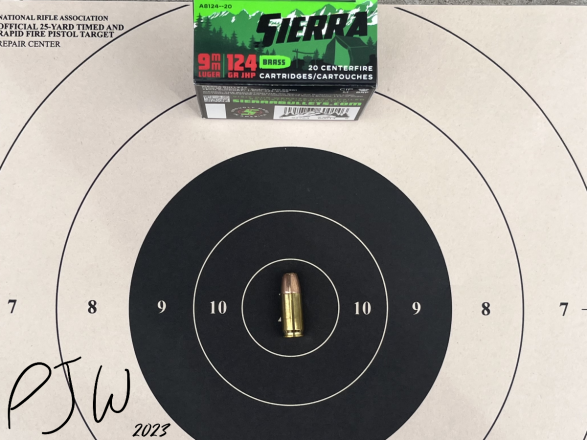
The Sierra Outdoor Master 124gr is a self defense load that I’ve seen all over Cabela’s, and the other big box stores. I don’t know much about this ammo, but it’s your standard JHP. Using the Sierra “Sports Master” JHP, this load is very average. I’ve shot it in my Glocks before, and found it to be fairly clean, and relatively accurate. Advertised muzzle velocity is 1090 FPS, out of an unknown testing gun. How’d it shoot in the EDC X9?
The Outdoor Master is light shooting, and has good practical accuracy. The ammo is consistent, and comfortable to shoot. I did have a magazine related early lock open, but that’s not the fault of the ammo. While we aren’t testing the terminal ballistics, this is a budget round with a budget bullet. It’s great for range testing or drill shooting, but I don’t think I’d want to carry it. Price fluctuates a lot for this round, hovering between $.60 to $1.00 a round. I purchased the tested ammo out of pocket, and got it on sale for about $.50 a round.
Federal HST 124gr
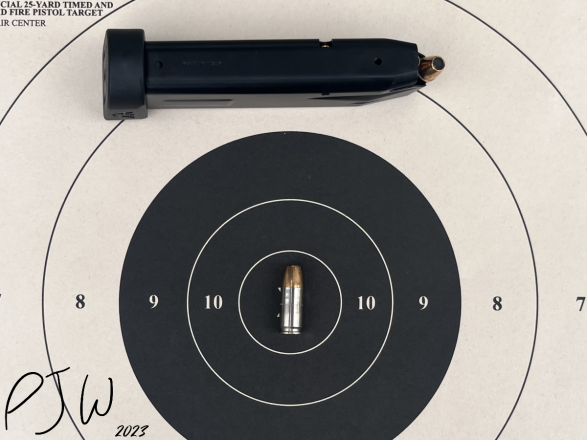
The Federal HST 124gr is one of my standby loads. I’ve carried this in many guns over the years, and still carry it in my non-comped guns to this day. I’ve shot a ton of this already in the EDC X9, with no issues. The HST has an advertised muzzle velocity of 1150, out of a 4″ barrel, and is generally soft shooting. The bullet design is a very good JHP, and performs well in FBI style testing. All of the HSTs use a brass casing, with nickel plating to improve feeding. How’d it do in this round of testing?
The Federal HST 124gr is very accurate, very consistent, and quite pleasant to shoot. Reliability was also perfect. This is a load that I have shot a ton, and rely upon for self defense. Needless to say, this is great ammo. Price per round tends to float between $.70 to $1.00. It really depends on where you buy it, and the time of the year.
Federal HST 124gr +P
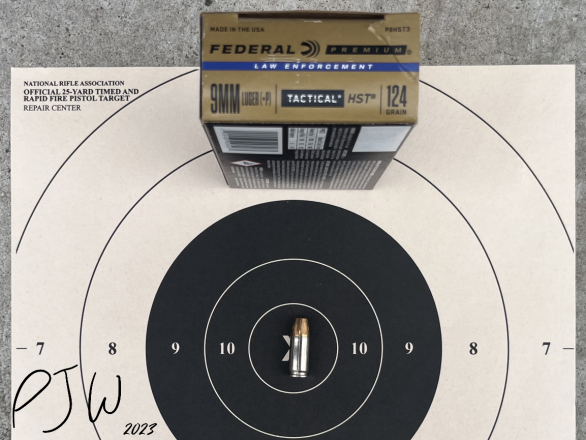
What if we took the HST 124gr, and made it hotter? That’s what the Federal HST 124gr +P is. Muzzle velocity is bumped up to an advertised 1200 out of a 4″ barrel, with the bullet design staying the same. This load also has a slightly different powder used, to reduce some of the muzzle flash. How’d it do?
The ammo is again, very consistent, very accurate, and generally reliable. Perceived recoil is a little worse than the standard pressure HSTs, but that’s to be expected. I did have a single magazine related malfunction, but not due to the ammo. I later tested both 124gr HSTs with “broken-in” mags, and had no issue. The HST 124gr +P runs about $.75 to $1.00 per round, depending on where you buy. While the HST 124gr +P isn’t my preferred load for the EDC X9, I’d be fine using it.
Ammo Incorporated 124gr JHP
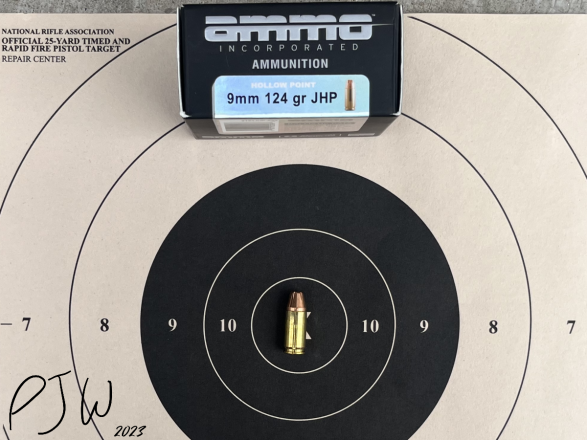
The Ammo Incorporated 124gr JHP is a load that I see all over the place. It’s got a negative perception, as I’ve heard a lot of horror stories about Ammo Inc. loads from friends. Unreliable, inconsistent, and even some split casings. However, this did not deter me in my testing. The 124gr JHP load uses a fairly traditional hollow point, with an advertised muzzle velocity 1120 FPS, out of an unknown test gun. How’d it shoot?
On initial shooting, the ammo felt a lot like range ammo. The velocity lines up with that, as 1120 isn’t super fast. Practical accuracy was also pretty good, no complaints from me. Reliability was also 100% here too. Consistency was fine, nothing crazy. The ammo didn’t feel inconsistent per se, but it also didn’t feel as consistent as the HSTs, for example. This is one of the cheapest JHP’s on the market, running about $.60 to $.80 per round. I don’t know if I’d trust this to carry (not that we’re testing that), but is shot fine as a range ammo for drills.
Black Hills 124gr +P JHP
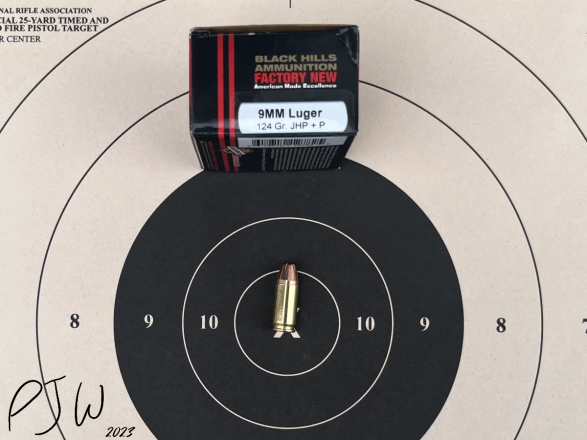
Rounding out the Black Hills ammo I tested, we have the 124gr JHP +P. This load is a slightly heavier bullet, with an advertised muzzle velocity of 1200 FPS out of a 4.5″ barrel. The bullet design is very similar to the 115gr loadings, just a little heavier weight. The last Black Hills +P loading was pretty miserable to shoot, how’d this one do.
The Black Hills 124gr +P was surprisingly soft given the last load. The ammo was still stout, more so than most of what I shot on this day, but much less painful than the 115gr +P load. Practical accuracy was good, and reliability was 100%. This is a hot ammo, but I’d rather shoot it all day than the 115gr +P. Price is also fairly average, at $.90 to $1.00 per round. Of all of the Black Hills ammo that I shot in the EDC X9, I’d buy this load again.
Federal HST 147gr
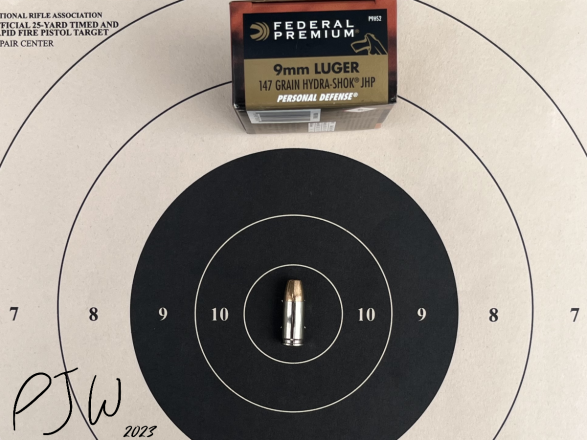
The final HST load I tested was the 147gr. The HST 147gr is a loading that a lot of my friends have used, but I’ve never messed with. Some people want a heavier bullet, to deal with barriers, or similar threats. I’ve always defaulted to the 124gr loads, as it was closer to my range ammo, and a little bit faster. The HST 147gr uses a tested bullet design, with an advertised muzzle velocity of 1000 FPS out of a 4″ barrel. Just like the other loads, we’ve got a nickel plated brass casing, to enhance feeding. How’d it shoot?
Just like the lower weight ammo, the practical accuracy and consistency are on point. With the heavier bullet and lower velocity, the slide speed felt a little sluggish, less of a jolt and more of a push. I was happy with my shooting with the ammo. Reliability was nearly perfect, again with a magazine related malfunction. I won’t knock the ammo for that, as it was a magazine issue. Still a valid data point though! Price per round for the 147gr HSTs is a little more than the 124gr loads, running about $.90 to $1.15 a round.
Remington HTP 147gr JHP
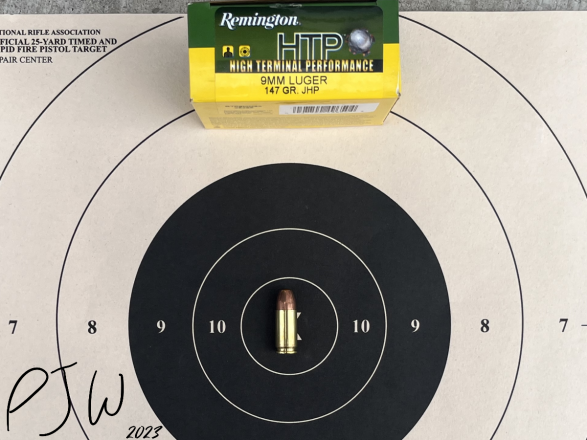
The second of the heavyweight ammos I tested was the Remington HTP 147gr JHP. This load has been on the market for a while, and has a pretty old style hollow point bullet. The muzzle velocity is 990 FPS, which is the slowest ammo I tested. HTP stands for High Terminal Performance, which we aren’t testing today, as I had no volunteers for that. However, we are testing how consistent, accurate, and reliable the ammo was. How did it perform?
The ammo was pretty consistent, and actually quite soft shooting for a 147gr bullet. Accuracy was good for practical use, and I ran into no malfunctions while shooting. This load might not have the most modern projectile, but it was extremely pleasant to shoot. Price per round is in the $.90 to $1.10 range, which is honestly a little high given the projectile design. That being said, I think I’d be happy using this ammo for more drills in the future.
Underwood 147gr +P XTP
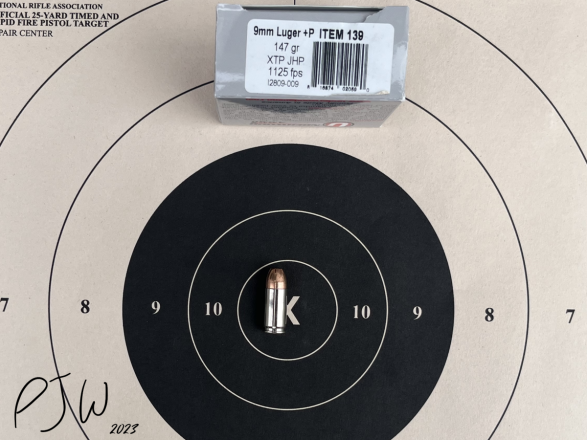
The Underwood 147gr +P XTP is the final load we are discussing, and was the final load I tested on this day. This is a very hot, heavyweight round. Underwood uses the Hornady XTP projectile, which is a pretty good bullet, and loads it into a nickel plated brass casing. Advertised muzzle velocity is 1125 FPS, out of an unknown test gun. This is pretty fast, and I was anticipating really harsh recoil.
I was surprised, as this load was not the harshest thing I shot on this day. It was only second harshest. This ammo has a lot of recoil for a 9mm, but the accuracy and consistency was there. I did have a malfunction with the ammo, which was a light primer strike. This was caused by brass or primer material fouling in the firing pin channel. The firing pin did not have enough oomph to get through the gunk, and ever so slightly tapped the primer of the loaded round. I kept the gun downrange, waited, and then inspected. I reloaded the round into the mag, chambered the gun, and finished shooting. It’s hard to say if this was ammo related, but it was a malfunction.
This ammo is way too hot to shoot recreationally, but the velocity and projectile would lend well to a carry ammo, just not really in an in EDC X9. Price per round is hovering in the $1.00 range.
Ammo Testing Conclusions
Well, let’s start with covering the malfunctions. I had four magazine related malfunctions, and one failure to detonate. The magazine related malfunctions were tied to two relatively new magazines I have, as the follower would engage a little on the slide release with one round remaining in the gun. I imagine there is a little break in for this, which is strange. For my first 1000 rounds with the EDC X9, I had no issues at all, but I was using 3 broken in magazines. None of these magazine related malfunctions were caused by the ammo.
For the fifth malfunction, it was a failure to detonate with the Underwood 147gr +P. I believe that this was caused by case/primer fouling in the firing pin channel. When we shoot hot ammo, sometimes we will have parts of the case or primer get left behind in the gun. When it comes to some of the really hot stuff I shot on this day, that certainly happened. That gunk and metal got into the path of the firing pin, and blocked it. This can happen, and did for me, but it’s a good data point.
In regards to the ammo that I liked the most, the standard pressure Federal 124gr HST and Barnes 115gr TAC-XP would take the cake. These two loads are easy to shoot, consistent, and accurate. I stock the HSTs regularly, and carry them in a ton of my guns. The Barnes load would be one that I’d be happy to buy for shooting drills, as it was extremely accurate, and again, soft shooting. Now, this does not pertain to “should I carry this”, as this was more of a test of the EDC X9, rather than the ammo. With firing 20 rounds of each type, I cannot tell you how a different lot of ammo will work in your gun. However, I know how those ammos will (generally) perform in this specific EDC X9. For terminal ballistics info, find some good, independent gel testing, done to FBI specs.
EDC X9 1500 Round Update
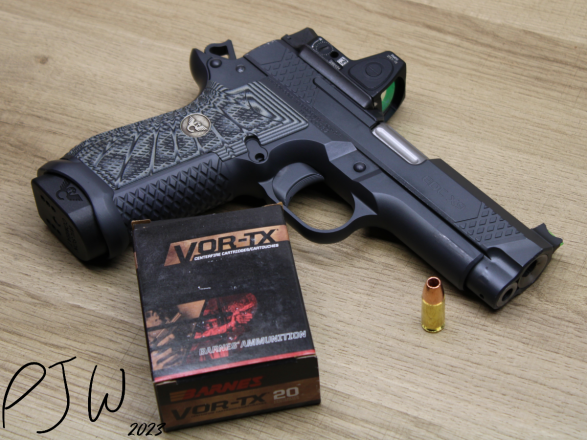
While a continuation of my testing for the Wilson EDC X9, I did find some things out here. Obviously, I found that the magazines have some form of break in/wear in. They are reliable, but every so often a new mag will lock open on the last round in the gun. I also found that this gun shoots a lot nicer with standard pressure ammo. While not a shocking revelation, I’d recommend shooting standard pressure, or weaker +P through the gun, over the really hot stuff.
I checked the gun after the test, and saw no new wear patterns. The gun is wearing in well, and is still pretty enjoyable to shoot. I swapped the original recoil spring for a fresh 13lb OEM one too, as a further preventative maintenance measure. The firing pin channel was also cleaned out again, to remove any excess chunks of case material. A review will be coming once I get to 2500-3000 rounds, or even more round than that.
A Thanks
Again, I’d like to thank Paul over at AmmoToGo.com for providing the ability for me to test this many ammunitions. Nearly everything that we do at Primer Peak is done out of our own pockets, so having a little bit of help with ammo goes a long way. The links to their site that you’ll find above are not affiliate links, just linking back to the specific page of the ammo I ordered.
I will say that my order from AmmoToGo.com showed up really fast, 6 days after ordering. They’ve got a pretty great selection of ammos over there, and a lot of the self defense loads have ballistic gel testing listed on the product pages. Their blog, The Lodge, is also a pretty good resource on ammo testing, and other good firearms related topics. David Lewis recently did an extremely scientific test on AR & Glock magazine springs that I found to be really interesting, as I’ve never seen anything like it online.
Again, they aren’t paying me, or us at Primer Peak to say nice things about them. Check them out, and if you decide to buy from them, maybe let them know that you found out about them through us. Thanks for reading, and stayed tuned for the next EDC X9 update!




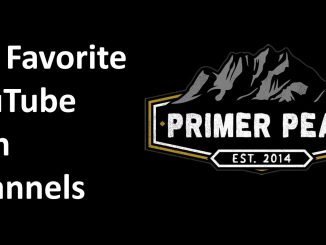
Be the first to comment